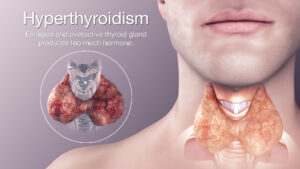Summary
Hyperthyroidism, which is also known as overactive thyroid, is the result of the thyroid gland making more thyroid hormone than your body needs. Hyperthyroidism can accelerate your body’s metabolism, which can cause unintentional weight loss and rapid or irregular heart beat. About 1% to 3% of the population are affected by this disorder. This mostly affects adults but women are 2 to 10 times more likely to develop hyperthyroidism than men. If left untreated, hyperthyroidism can cause serious health problems. But there are treatments that can help.
What is the Thyroid?
To better understand what hyperthyroidism is, we need to learn more about what the thyroid is and what it’s functions are.
The thyroid is a butterfly shaped gland in the front of your neck. This gland is responsible for controlling the way your body uses energy. It produces hormones known as thyroxine and triiodothyronine which affect nearly every organ in the body. If the thyroid begins producing too much thyroxine, the result is hypothyroidism. The image below shows what an inflamed thyroid gland looks like.

Causes
Known causes of hyperthyroidism include thyroiditis (inflammation of the thyroid), too much iodine consumption, thyroid nodules (growths on the thyroid), too much thyroid medication (taken by those with hypothyroidism), and Grave’s Disease. Although all of these are known causes, Grave’s Disease is the most commonly known cause of hyperthyroidism. This accounts for about 70% of cases.
Symptoms
The symptoms of hyperthyroidism vary from person to person. These may include
- Fatigue
- Rapid or irregular heartbeat
- Weight loss
- Bulging eyes
- Muscle weakness
- Irritability and mood swings
- Trouble sleeping
- Frequent bowel movements or diarrhea

- Goiter
- Tremors usually in hands
- Hair loss
- Excessive urination
- Excessive thirst
Adults over 60 may experience different symptoms than younger adults, such as loss of appetite or self isolation. To the right of these listed symptoms is an image showing a healthy functioning thyroid on the left side and an unhealthy, inflamed thyroid on the right.
Treatments
Medication
The good news is there are effective treatments for hyperthyroidism. Doctors typically start with an antithyroid medication to bring thyroxine hormone levels back to normal. This option is the simplest option and may require staying on the medication for several years but often not the best long term treatment.
Another form of medication would include beta blockers.These can help reduce symptoms such as tremors, nervousness, and rapid heart rate.
Radioiodine therapy
This is a very common and effective treatment for hypothyroidism. This treatment involves taking radioactive iodine by mouth in liquid or capsule form. The radioactive iodine slowly destroys the cells that produce the thyroid hormone. It fortunately does not affect other body tissues.
Surgery
A thyroidectomy is when the thyroid gland is partially or mostly removed. This is a good option for people with large goiters or pregnant women who are unable to take thyroid medications. The side effects of this kind of treatment will likely require having to take thyroid medication for the rest of your life. Most people who have this surgery end up with hypothyroidism as a result.
Untreated Hyperthyroidism
If left untreated, hyperthyroidism can cause some very serious damage to the body. This can include blood clots, stroke, heart problems, vision loss, osteoporosis, and fertility issues in women. Heart problems are the most common side effect if untreated. When you have an overactive thyroid, it’s as if your body is always in overdrive. Which can have a huge impact on cardiovascular health. Although there is no true prevention for developing, it is recommended avoid consuming too much iodine which can cause an increase in thyroid hormone production.
https://www.verywellhealth.com/hyperthyroidism-diet-5111886
This article covers what to eat when you have hypothyroidism. Experts recommend that you follow a low iodized diet and avoid certain foods that my impact your thyroid such as cruciferous vegetables and soy. Tweaking your food intake can help slow the progression of hypothyroidism.
After a population-based control case and cohort study, researches have determined that patients with thyroid disorder are not at increased risk of complications due to Covid-19 or SARS-coV 2. In a review of population-based data, the risk of contracting the viruses did not differ between patients with Hyperthyroidism or Hypothyroidism as compared to the control group.
Even though previous research has found that having hyperthyroidism doesn’t make you more vulnerable to Covid-19, they have found that it may cause a relapse in a person with Grave’s Disease. About 15% of patients with mild to moderate covid symptoms have a dysfunctional thyroid. More research is needed to determine whether or not those with thyroid dysfuction are a greater risk of complications due to covid-19 infections.
“What Are The Causes Of Hypothyroidism?” | Webmd |
https://www.webmd.com/a-to-z-guides/causes-hyperthyroidism
“How Does The Thyroid Gland Work” | NCBI | https://www.ncbi.nlm.nih.gov/books/NBK279388/
“Hyperthyroidism:Also Called: Overactive Thyroid” | Medline Plus | https://medlineplus.gov/hyperthyroidism.html
“Hyperthyroidism” | Familydoctor.org | https://familydoctor.org/condition/hyperthyroidism/